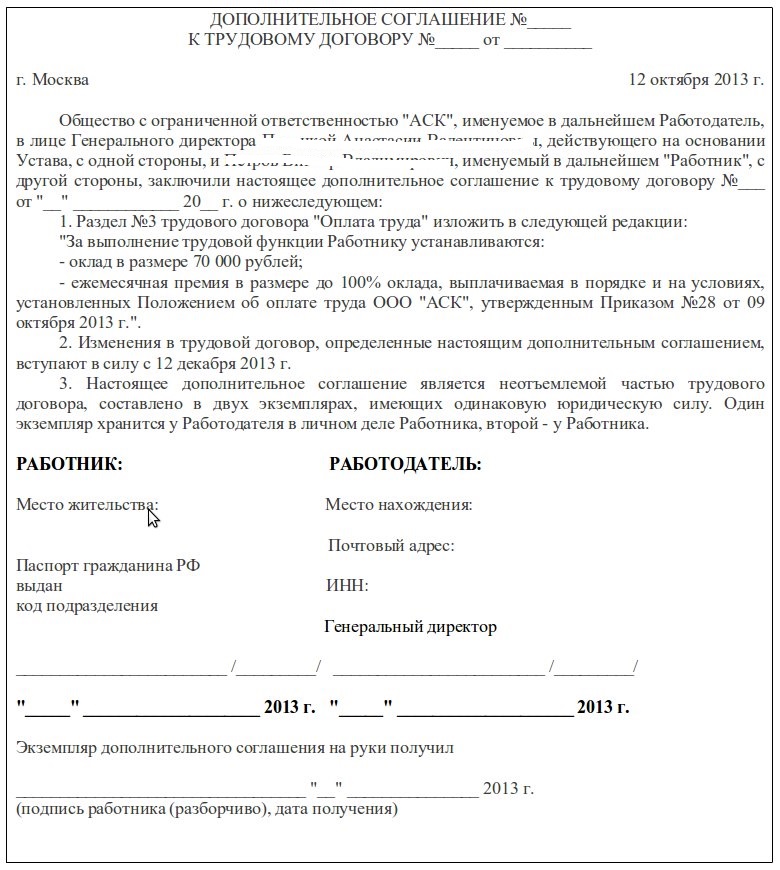Any employment contract includes both basic conditions and additional ones. The content and procedure for their inclusion in the agreement is determined by labor law. Let us consider in more detail what additional conditions of an employment contract are most often encountered.
Legal basis
In addition to the fact that the agreement imposes certain obligations and rights on its signatories, the document must also contain conditions and information that are equated with legal facts. These are details of the parties, information about the place of conclusion of the agreement, etc.

All conditions, according to labor law, are divided into essential and additional. Further, we dwell in more detail on the basic and additional conditions for concluding an employment contract.
Rights and obligations of the parties
Usually the rights and obligations of an employee are more specifically specified in the job description, but the employment contract also contains these provisions. When agreeing on the terms of the employment contract, the norms of Art. 9 Labor Code of the Russian Federation. Examples of agreed provisions are:
- additional payments upon dismissal of an employee for some reason;
- the ability to transfer salaries to a bank account;
- the possibility of business trips, etc.
Basic and additional conditions
Essential conditions are those without which it is impossible to draw up a contract and, therefore, the beginning of work. These conditions include:
- Place of employment. The actual address at which the employee works is indicated.
- Start date of employment.
- Time allotted for rest and workflow.
- Employee functions. This includes position, qualification, profession, etc.
- Form of payment and conditions. This also includes information about bonuses, allowances and surcharges.
- The nature of work.
- Compensation and warranties for hazardous exposures.
- Social insurance.
- The validity period of the contract.
- Other provisions regulated by labor law.

But what can be attributed to the additional conditions of the employment contract? Firstly, these conditions should not worsen the position of the employee in the organization. Secondly, add. conditions are not mandatory, that is, an agreement can be concluded without them. Thirdly, if among such provisions there are those that contradict labor standards and restrict the rights of an employee, they will be declared invalid and not enforceable.
So, the additional conditions of the employment contract are:
- Presence of a trial period.
- Non-disclosure by an employee of a business or other secret organization.
- Employee Insurance.
- Improving the social conditions of the employee.
- An obligation to work out if the organization has paid for employee training.
- Other provisions not contrary to labor law.
Probation
Additional terms of the employment contract include the passage of a probationary period. This is the most common document provision. This clause is included so that the employer can verify the employee for compliance with the position. In the absence of this condition, the employee shall be deemed hired without a probationary period. Moreover, if the condition is not indicated in the employment contract, it cannot be included in the order of employment.

If the employee was allowed to work without signing the agreement, then the test item can be included in the text of the contract, provided that the parties executed it in writing before starting work.
The labor standards also state: if the employer offers a probationary period and the employee is against, this condition is excluded from the labor contract. In fact, the exact opposite happens: in case of refusal to pass the test, the applicant simply does not get a job.
But it should be remembered that there are categories of citizens who are forbidden to establish a test:
- the person who received the position through the competition;
- pregnant employees and women with children under 1.5 years old;
- person under the age of majority;
- a person who first entered a job in a specialty after graduation from an accredited institution;
- a person invited by transfer from another employer;
- a citizen who has concluded a contract for 2 months;
- other persons whose cases are prescribed by law.
Non-disclosure of secrets
As an additional condition of the employment contract, non-disclosure of certain information relating to the organization is considered. This can be commercial, military, medical, notarial secrets, personal data, etc.
If the employee violates the prescribed silence, the manager has the right to apply dismissal as a disciplinary sanction.
It should be noted that those persons who will be dealing with a state secret on duty must first obtain access to work in the established form.
From judicial practice it follows that the dismissal due to the disclosure of secrets can be challenged. So, if an employee does not agree with the reasons for dismissal, he can go to court. After that, the employer will have to prove that the information voiced by the employee belongs to state, commercial, official secret or personal data of a third-party employee. Moreover, this information became known to the employee during his labor activity and he undertook not to voice it, as a document signed by both parties should testify to.

Also, the contract may be terminated in connection with the expiration of the admission to state secrets, if the performance of labor obligations requires this document.
Insurance
Additional conditions of the employment contract also establish the employee's opportunity to receive additional insurance: both medical and social.
Health insurance is often used by managers as a way to retain highly skilled professionals in an organization. Initially, the head determines the list and categories of employees who may subsequently be entitled to such insurance. It turns out that upon employment the applicant already has an idea of what he can count on in the future.
The head has the right to establish payment options for the policy. Some organizations practice piecework payment. For example, a large half is paid by the organization, the rest is paid by the employee.

Another type of additional insurance is considered contributions to the FIU (in addition to those that the organization deducts). According to legislative norms, any citizen has the right to deduct voluntarily contributions to the Pension Fund for the funded part of the pension. But the size of these contributions, as well as the contributions of the employer, should be reflected in the payroll.
According to Art. 8 FZ-56 dated 04/30/08, the head may, at his discretion, pay additional contributions for those employees who pay on the funded part of the pension. On this occasion, an organization or order shall be issued in the organization.
Improvement of conditions
The provision of housing may also relate to the clause of the content of the employment contract. Additional conditions of this nature are regulated by the Housing Code.According to the legislation, official housing is provided to a citizen if his work involves:
- with state authorities;
- local government bodies;
- unitary enterprise;
- state institution or municipal institution.
In addition, service housing is required:
- contracted military personnel and their families nearby;
- police officers who do not have housing at the place of service and members of their families;
- local police officer;
- federal, state and civil service employees, as well as Rosleskhoz employees;
- medical workers, pharmacists while working in medical institutions of the state system of the constituent entities of the Russian Federation.
Among other things, additional conditions of the employment contract may include the provision of vouchers to motels and boarding houses.
Commitment to fulfill
This clause can be included both at the conclusion of the contract, and later as an additional agreement to the labor contract, while working conditions do not change. It is important that employee training be paid by the organization. If an employee paid for training at his own expense, the manager does not have the right to demand training from him.

The period of development is determined by the head, for example, depending on the money spent. An employee who has been trained at the expense of the company is considered financially responsible for cost recovery.
If an employee is going to quit before the end of the working time without a good reason, he is obliged to reimburse the funds spent on training. This fact is indicated in article 207 of the Labor Code.
If an employee after training has not started work for a good reason, he is exempted from payments. For example, an employee was ill during training, and labor activity in the previous position is contraindicated for medical reasons.
Changes
You can change not only the essential terms of the contract, but also additional ones. The change initiative can come from both management and an organization employee. It is important that both parties are informed in writing of the change in a timely manner.
If you change the additional conditions of the employment contract, as well as the essential ones, at the request of the head, the employee must be notified for several months. And only after the employee’s consent to work on new conditions, can we proceed to further negotiations and drawing up additional agreements.

If the employee does not want to change the terms of the contract, the manager must offer vacant positions in such positions or terminate the employment relationship.
